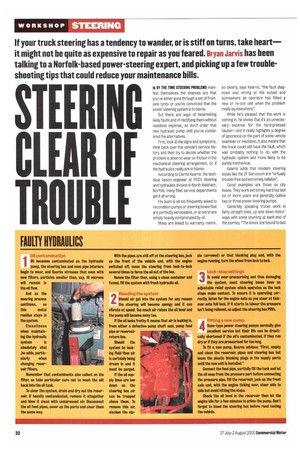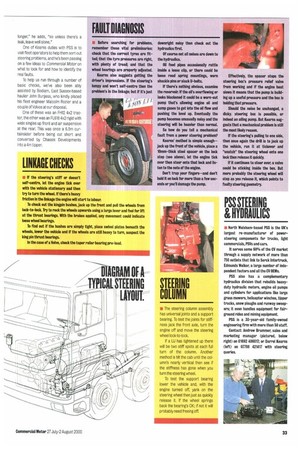STEER!
Page 34

Page 35

If you've noticed an error in this article please click here to report it so we can fix it.
CLEAR OF TROUBLE
If your truck steering has a tendency to wander, or is stiff on turns, take heart— it might not be quite as expensive to repair as you feared. Bryan Jarvis has been talking to a Norfolk-based power-steering expert, and picking up a few troubleshooting tips that could reduce your maintenance bills.
• BY THE TIME STEERING PROBLEMS manifest themselves the chances are that you've either gone through a set of frontaxle tyres or you're convinced that the power steering system is to blame.
But there are ways of determining likely faults and of rectifying them without needless expense, so don't order that new hydraulic pump until you've considered the alternatives.
First, look at the signs and symptoms, think back over the vehicle's service history and then try to decide whether the problem is down to wear or friction in the mechanical steering arrangement, or if the hydraulics really are to blame.
According to Darrel Kearns, the technical liaison engineer at PSS's steering and hydraulics division in North Walsham, Norfolk, many fleet service departments get it all wrong.
His team is all too frequently asked to recondition pumps or steering boxes that are perfectly serviceable, or at worst are simply heavily contaminated by oil.
Many are linked to warranty claims, so clearly, says Kearns, "the fault diagnosis was wrong at the outset and somewhere an operator has fitted a new or re-con unit when the problem really lay elsewhere".
While he's pleased that the work is coming in, he knows that it's an unnecessary expense for the hard-pressed haulier—and it really highlights a degree of ignorance on the part of some vehicle examiner or mechanic. It also means that the truck could still have the fault, which was probably nothing to do with the hydraulic system and more likely to be purely mechanical.
Kearns adds that modern steering boxes like the ZF Servocom are "virtually trouble-free and extremely reliable".
Good examples are those on city buses. They work extremely hard but last six or more years and generally outlive two or three power steering pumps.
Generally speaking trucks work in fairly straight lines, up and down motorways with some shunting at each end of the journey. "The boxes are bound to last longer," he adds, "so unless there's a leak, leave well alone."
One of Kearns duties with PSS is to visit fleet operators to help them sort out steering problems, and he's been passing on a few ideas to Commercial Motor on what to look for and how to identify the real faults.
To help us run through a number of basic checks, we've also been ably assisted by Bodiam, East Sussex-based haulier John Burgess, who kind placed his fleet engineer Malcolm Ruler and a couple Of Volvos at our disposal.
One of these was an FH12 4x2 tractor, the other was an FL618 4x2 rigid with wide singles up front and air suspension at the rear. This was once a 6.5m curtainsider before being cut short and converted by Chassis Developments into a 4m tipper.












































































































